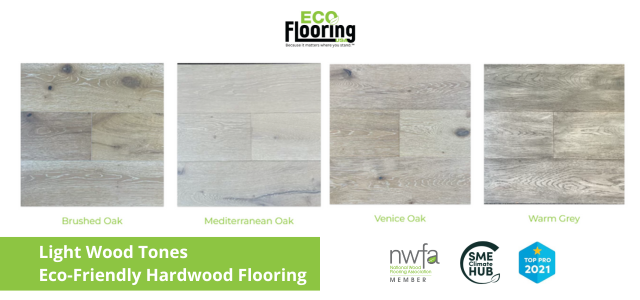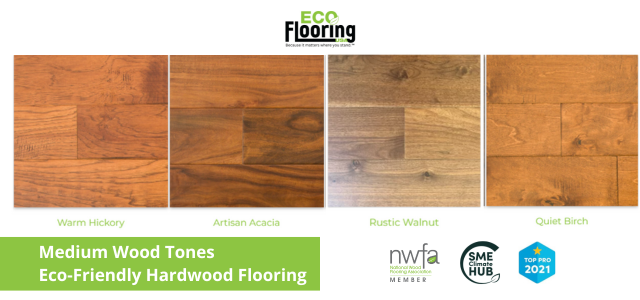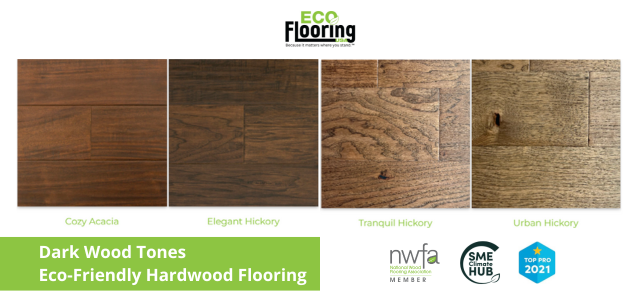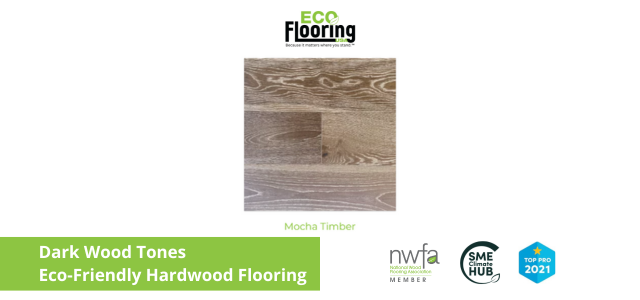Hardwood floor colors play a pivotal role in shaping the overall aesthetic and ambiance of a space.
The right choice can significantly impact the mood, perception of space, and even the perceived temperature of a room.
Whether you’re designing a cozy living room, a sophisticated office, or a vibrant kitchen, selecting the right hardwood floor color is essential for achieving the desired atmosphere.
In this guide, we’ll explore the trends for 2024, providing examples and insights into how each choice can impact the aesthetic of a space.
Hardwood floor colors options
There are different color options for hardwood floors. Find out more about the main ones!
Natural Wood Tones
Natural wood tones refer to the inherent colors found in the wood itself, without the application of additional stains or finishes.
These tones are influenced by the species of wood used and can range from light to dark.
They are particularly suitable for creating warm and inviting atmospheres in living rooms and bedrooms and for spaces that prioritize a connection to nature, such as sunrooms or outdoor living areas.
Light Wood
 Light wood floor tones, such as blonde or natural oak, showcase the natural color of the wood and contribute to a bright and open atmosphere.
Light wood floor tones, such as blonde or natural oak, showcase the natural color of the wood and contribute to a bright and open atmosphere.
They are ideal for spaces where a sense of airiness and modernity is desired.
Light wood floors are versatile, working well in contemporary, Scandinavian, and coastal-inspired designs.

Medium Wood
 Medium wood tones, like hickory or cherry, strike a balance between light and dark.
Medium wood tones, like hickory or cherry, strike a balance between light and dark.
These colors highlight the grain patterns of the wood and add warmth to a room.
Medium wood floors are versatile, complementing various design styles, from traditional to transitional. They provide a timeless and classic look.

Dark Wood
 Dark wood tones, such as mahogany or walnut, create a rich and luxurious ambiance.
Dark wood tones, such as mahogany or walnut, create a rich and luxurious ambiance.
These floors add depth and sophistication to a space but may make smaller rooms feel more intimate.
Dark wood floors are well-suited for traditional and formal designs, imparting a sense of elegance.

Stained Hardwood Floors
Stained hardwood floors involve applying a colored stain or finish to alter the natural color of the wood.
This process allows for a wider range of color options, providing flexibility to match various design preferences.
Grey Tones

(Photo: Eco Flooring USA’s client)
Grey-tones offer a contemporary and elegant aesthetic and provide a neutral backdrop, allowing other design elements to shine.
Ranging from light greys to deep charcoal, these floors complement modern and industrial designs.
Red Tones

Red-toned, such as cherry or red oak, introduce warmth and character to a space. These floors are well-suited for traditional and rustic designs, adding a touch of richness.
Red-toned hardwoods work harmoniously with earthy color palettes and classic furnishings.
Espresso and Black Tones
 Espresso and black-toned hardwood floors create a bold and dramatic look.
Espresso and black-toned hardwood floors create a bold and dramatic look.
These dark colors contribute to a modern and sophisticated atmosphere.
While they can show scratches more prominently, proper care and maintenance ensure they remain sleek and stylish.

Tips for Choosing the Right Hardwood Floor Color
Now, we are going to present some tips so that you can properly choose the color for your hardwood floor!
1 – Consider the overall style of the room
The overall style of the room should guide your choice of floor color. For a modern and airy feel, light wood tones may be suitable, while dark wood tones can enhance a traditional or formal setting.
Consider the existing decor, architectural features, and the ambiance you want to create.
2 – Take into account the dominant light and color of the space
Natural and artificial lighting can influence how hardwood floor colors appear. Consider the dominant light color in the room when choosing a floor color.
- Warm-toned lighting may enhance the richness of red or medium-toned woods, while cooler lighting can complement grey or dark wood tones.
- Fluorescent lights can emit a cool, bluish hue that may affect the perceived color of floors. This can make warm-toned floors appear cooler.
Be mindful of how the light interacts with the floor throughout the day.
When possible, assess floor samples under the lighting conditions of the intended space to ensure the chosen color aligns with your vision.
3 – Think about the size of the room
The size proportions of the room and the color plays a crucial role in color selection and impact the perception of space.
Lighter wood tones can make a smaller space feel more expansive, while darker tones may create a cozier atmosphere.
4 – Match the color with existing furniture and decor
Consider the color palette of your furnishings and choose a floor color that complements or contrasts in a deliberate and aesthetically pleasing way.
This ensures a cohesive and well-designed look.
5 – Explore the impact of different stains
If you opt for stained hardwood floors, explore the impact of different stains on the wood.
Stains can alter the color and appearance of the floor, providing a range of options to achieve the desired look.
Test samples in the actual space to see how they interact with the room’s lighting and other elements.
Conclusion
Choosing the right hardwood floor color involves a thoughtful consideration of the room’s style, lighting, size, existing decor, and the impact of different stains.
By taking these factors into account, you can make a well-informed decision that enhances the overall aesthetic of your living space.
Eco-Friendly Hardwood Flooring in Metro-Atlanta, GA.
Finally, here at Eco Flooring USA, we stand as a premier destination for those seeking the epitome of quality and elegance in hardwood flooring.
FaQ
Read more:
- Know the benefits of engineered hardwood floors!
- Carpet vs Hardwood Flooring: compare these two options!
- Can you refinish engineered hardwood floor?



